Tired of Twitter? Try These Social Media Alternatives!
Twitter getting a bit musky? There are cleaner options in the cloud.
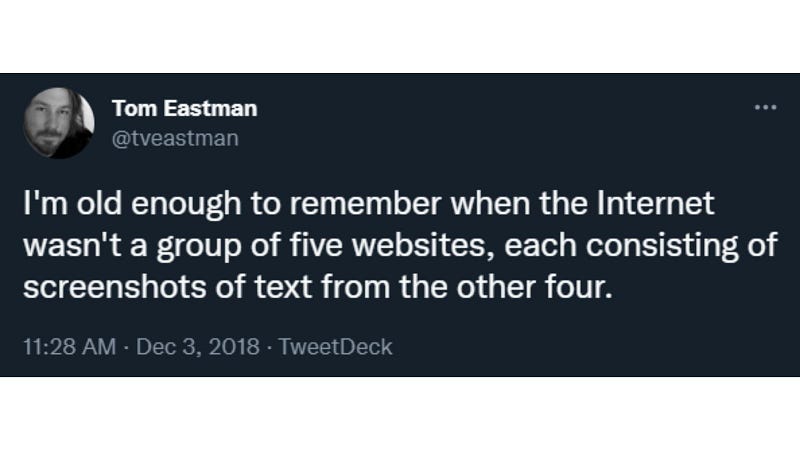
Its name has become ubiquitous with modern news: Twitter has defined a generation of social connection and on-the-ground reporting the likes of which simply wasn’t available twenty years ago. Granted, it wasn’t available because the lifeblood of small, local reporting networks was already being sucked dry by mega-corporations, but the point stands firm: Twitter offered the world an open, accessible, and powerful mode of conducting the most important work of our society.
The whole Internet used to be dedicated to this. As Tom Eastman, a technologist and writer, posted on Twitter a few years back:
Irony knoweth no limits in the Internet age.
I’m old enough to remember when the Internet wasn’t a group of five websites, each consisting of screenshots of text from the other four.
But now, Twitter is on the way out, having found itself purchased for over 40-billion dollars by the problematic Elon Musk. That’s made a lot of people uncomfortable, and has many considering an exodus from Twitter. Previous issues like this with other social media giants like Facebook have led to boosts for companies like Signal, your best option for secure and private instant messaging, so it’s entirely possible that this will do the same.
With one problem.
How do you know which social media service to switch to when leaving Twitter?
This is the big question: how do you pick from all the possible options out there? Plenty of people will stay on Twitter, of course, and that’s fine. But if you want to open a second social media account, even just to diversify away from Twitter a little and find a new community, where can you look? I’ve written about this in the past, but this time **I’m going to focus on a side-by-side comparison with Twitter for features, including free speech, safety, and general usefulness.
Note: This is a hot topic right now, and many articles are getting written about just this issue. But recommendation to sites like Minds, Gab, and Plurk aren’t good options: either because they’re not safe environments (even remotely) or because the service is basically dead.
Some of the options I list here are specialized, but all function!
Mastodon, the one-to-one Twitter replacement (kind of)

Mastodon, the one-to-one Twitter replacement (kind of)
Mastodon is often touted as a one-to-one Twitter replacement, but with actual privacy options. And it is that, largely because its design is completely cloned from Twitter, though with all the excellent design elements of TweetDeck thrown in for good measure.
Mastodon is a “federated network”, which is really a fancy way of saying that no single company controls all the different groups — but any member, from any group, can interact with members of another group. Everyone shares the same infrastructure, but lives in different communities.
Out of all the federated networks currently around, Mastodon is the best-known and most used, and it’s so dang familiar in terms of basic use that, once you’re on it, you’re going to feel like you never left Twitter.
There are some complications with signing up on a federated platform like this that will turn people off, however. There aren’t many, and none of these are hard to overcome, but it adds just enough friction to make things a little extra difficult for the average or non-tech-oriented user.
Still, I recommend it. Mastodon has several lively “instances” or communities, and you’ll likely find it easy to navigate once you’re there.
WT.Social, from the founder of Wikipedia comes a new type of social media

WT.Social, from the founder of Wikipedia comes a new type of social media
WT.Social (also known as “WikiTribune Social”) is the perfect social media service to use if you get your news from Twitter. WT.Social is the genius creation of Jimmey Wales, founder of Wikipedia. The service contains no advertisements and runs on donations.
This is not a replacement for many of Twitter’s more engaging and addicting properties, but it is the best possible replacement for an active community of thinking people who are constantly conversing, building upon one-another’s discussions, and providing evidence-based arguments.
The site’s membership is climbing only slowly, largely due to it simple wiki-style design, a far-cry from the modern flashy format of Twitter, Facebook, or even Tumblr. But what its community is actually doing makes it one of the most progressive and interesting social media experiments on the web, and I highly recommend that you create an account there today.
Tumblr, social media for trendsetters

Tumblr, social media for trendsetters
Tumblr has been around the block, having changed hands many times. With the sale of Twitter to Elon Musk, Tumblr has had a huge influx of users, both old and returning, who are looking for someplace where similar community dynamics to Twitter can be found (as well as a strong mix of both visual and text-based content).
One of the neat things about the Tumblr feed is that there is no algorithm — users see the posts of the people they follow chronologically. Sometimes, this makes binging a little ridiculous, as you can end up scrolling through literally dozens of posts by one person before suddenly emerging into a completely different type of content provided by someone else. But I personally love that: it feels like you really get to interact with the people who you follow.
Tumblr also has great communities for nearly every possible interest area, a sleek user interface, and a highly dynamic profile page customization ability.
The main downside is that there are ads injected into your feed, seemingly at random, and they’re sometimes more intrusive than those found on Twitter. You can pay (about $40/year) to have all ads removed (you also get a number of “pro” features). That might be worth it if you really hate ads or if you use Tumblr as your main blog or website.
Issues with Tumblr in the past?
Tumblr’s changed hands a bunch over the years, and has gone through some periods where users were disgruntled due to heavy-handed attempts to cull adult content from the site.
In January 2022, Tumblr reached a settlement with New York City’s Commission on Human Rights, which had claimed that the 2018 ban on adult content disproportionately affected LGBTQ+ users. The agreement required the company to review its algorithms, revise its appeals process and review closed cases, and train its human moderators on diversity and inclusion issues.
Now, the site is also owned by Automattic, the company that owns WordPress. While they’re not planning on allowing lots of adult content back on the site, it does seem like they have a legitimate interest in maintaining Tumblr and making it sustainable as a companion to WordPress.
Ello, the social network for artists

Ello, the social network for artists
Ello was created as an ad-free alternative to existing social networks. It has pivoted from its earlier Facebook-like incarnation toward a Pinterest-like website showcasing art, photography, fashion and web culture.
There’s a lot to love about this often-overlooked site, and though it doesn’t boast the user numbers of the larger networks, it definitely has a dedicated community. If you’re at all artistic, want to show off your skills, or just love exploring the work of artists leading the way into the future, this is a great place to be.
Vero a truly social network with flare

Vero a truly social network with flare
Vero markets itself as a social network free from advertisements, data mining and algorithms. Commissioned in 2015 by the Saudi billionaire Ayman Hariri, the network is conceived as eventually becoming self-supporting through paid memberships. Free-for-life accounts were originally capped at the first million members, with that number extended indefinitely (likely in hopes of further developing its user base). Known as the main Internet home of Zack Snyder, Vero became a major hub of DC’s superhero community.
It’s got some features which improve upon default privacy settings of sites like Facebook, but, while it touts itself as being a privacy-centered service, it actually does little to truly protect its users in any meaningful way. When I asked them about their plans for P2P encryption last year, Vero responded that they were considering future implementation of some form of zero-knowledge communication. That would be a major boon for privacy enthusiasts if it became the case, but I imagine that the company wants to establish itself in the mainstream before taking that route.
Unlike some modern privacy-focused sites, Vero maintains strong anti-racist language in all their marketing materials, which has proved to be a boon for younger membership numbers.
The features are pretty great and with both mobile and desktop apps, a suite of great features, and an intriguing and surprisingly vibrant community, it offers one of the lowest barriers to entry for users familiar with other modern social networks. The only question, then, is: is this billionaire’s website any better than the others’? Possibly. I think time will tell, but their currently accepted business model and slight hint about a possible plan toward tighter privacy make me hopeful.
Raftr builds college communities through social media

Raftr builds college communities through social media
If you’re in a school or college, Raftr is a great option for you that will feel incredibly familiar to users of Twitter, while also improving on certain aspects of the newsgetting and social experience. The downside is that it’s completely localized to your college or school, meaning that it’s only helpful if you’re already connected to that scene. For the broader public, this service is less helpful.
Aether is an ephemeral, peer-to-peer social network
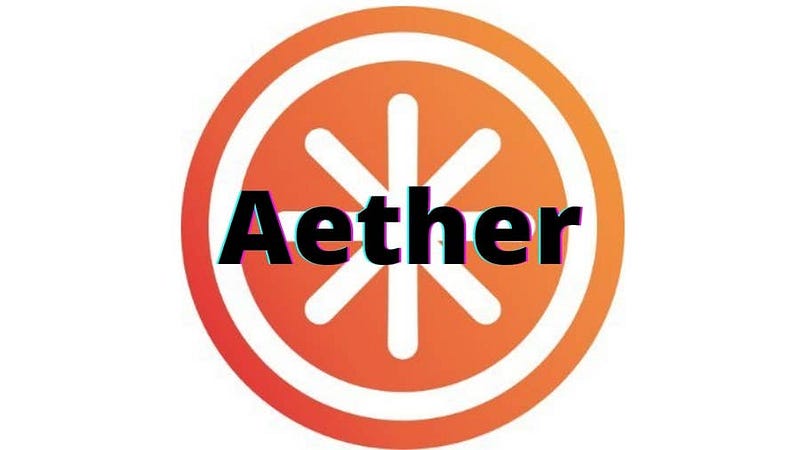
Aether is an ephemeral, peer-to-peer social network
Aether is a neat idea that might be able to bypass some of the problems that both ends of the political spectrum have with social media: too much moderation and not enough moderation. That’s because moderation is handled by the community as a whole, and by an individual user’s preferences, which allow them to change who gets to moderate what they see.
The platform is committed to privacy as well, and being peer-to-peer (meaning that there’s no giant server sitting between you and your friend when you chat) it’s inherently more secure than Twitter.
The catch is that it’s a work in progress with a smaller community. Still, the changing landscape of social media might make it a good choice in the days ahead.
Amino, social media microblogging for the youths
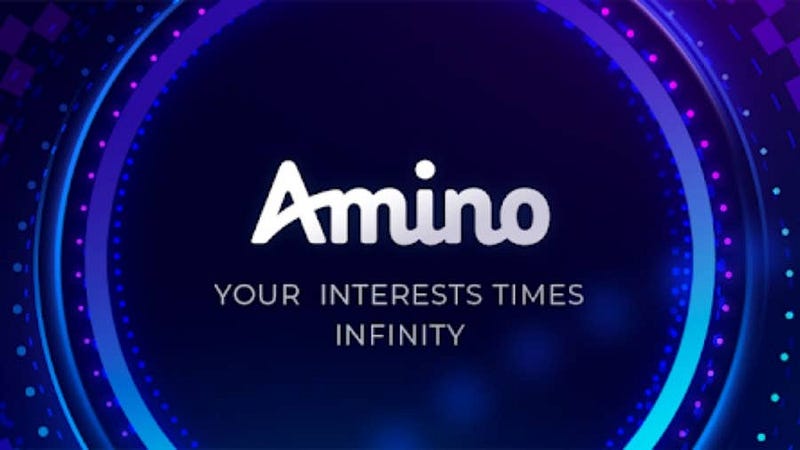
Amino, social media microblogging for the youths
Amino is a mobile-only social media service dedicated to hosting individual communities that members can join, allowing you to focus in on only those communities who are likely to share your specific interests. Historically, the site features primarily younger audiences, but that might start to shift further as people look to Twitter alternatives.
Amino users have news feeds, chatrooms, quiz and poll capabilities, and voice chat built into their experience, and the design of Amino means that you’re more likely to engage with the community itself than to outside links. This is kind of nifty, as it means you’re going to escape the plague of news-related overload that can so easily occur, while perhaps maintaining the social ties that are actually the point of these networks.
The focus of the app is on anonymity as well, allowing you to connect with strangers without revealing your actual identity. That’s a huge departure from Twitter’s purpose, but one that might be interesting to explore (and there’s nothing keeping you from revealing who you are).
The site is funded entirely by investors, with plans for premium upgrades and digital goods in the near future as an ad-alternative revenue stream.
MeWe, an alternative to the old-guard social media
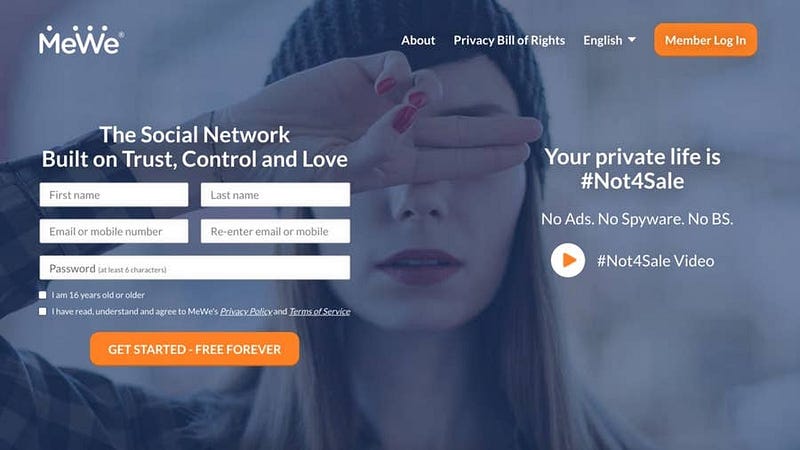
MeWe, an alternative to the old-guard social media
MeWe has been around since 2015 and is, in many ways, the least problematic of all the alternative social media sites dedicated to privacy. This is partly because it counts people like Tim Berners-Lee among its advisers, and because it was genuinely created for a desire to have a social media network that did not rely on advertising, data-mining, or social algorithms to maintain and grow its userbase. Whereas sites like Minds or Gab intentionally catered to far-right extremists, MeWe only caters to such groups incidentally, through its design.
In a perfect world, the marginal extremist communities on MeWe would be blotted out by all the other users, but since the membership has remained relatively small, this has yet to occur. The leadership of MeWe is in a tough place, being both opposed to censorship and opposed to extremist content, whilst trying to operate a privacy-respecting social media service.
In terms of function, it’s more a Facebook clone than a Twitter clone, but generally features all the functionality one would expect from a modern service. For the price of a coffee a month, you can upgrade to their Pro account and get more features and graphics packs.
Discord communities localize social media
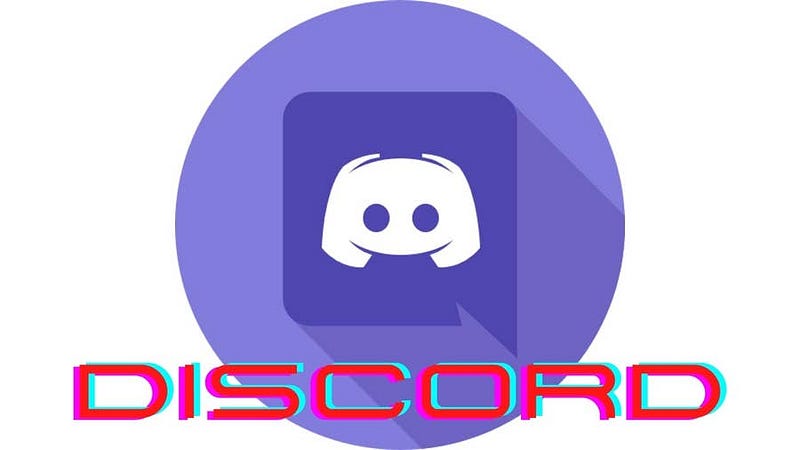
Discord communities localize social media
Discord was once a haven for gamers, but since the Covid-19 pandemic its prospects have soared as a true online community space for people of all ages, offering better functionality than older business software like Slack, and truly trying to provide a modern e-community hub for people worldwide.
Discord would be a vastly different experience from the completely public-facing Twitter, but the things that people get from Twitter — the good communities, the supportive tags, the strangers who can become friends, and the access to interesting news, can all be found within different Discord communities. Some communities will be specialized (around a game, or a subject like writing), but others will be more open and freeform.
There are plenty of serious problems with Discord, like the lack of zero-knowledge encryption and peer-to-peer messaging, but these are issues that most modern services are struggling to understand (and will likely require good legislation to enforce). Overall, it’s a powerful way to maintain those community ties (just keep Signal around for when you actually need to send important things).
Medium, the middle-ground for social netowrking

Medium, the middle-ground for social networking
Evan Williams, co-founder of Blogger and Twitter, created Medium in 2012 as an alternative to Twitter that would allow for longer-form posts. Eventually, it evolved into a social journalism experiment with its mixture of professional and amateur writers and publications, becoming one of the must popular sources for news and original writing on the Internet.
Medium is totally different from Twitter in one sense, with far more emphasis placed upon the writing being shared, but there is an underlying community social aspect that cannot be overlooked. Being successful on Twitter and being successful on Medium are quite similar: if you spend a lot of time engaging with a community on either, you’re going to get more of your stuff read, gain more followers, and build a strong audience that follows you.
In 2020, Medium launched Momentum, focusing on subjects like anti-racism and civil rights.
OpenDiary, the classic anonymous social media blog

OpenDiary, the classic anonymous social media blog
OpenDiary is a good alternative to Twitter if your main use of the bird site was to share about yourself and your life. The interface is different, but so is the whole point: it’s not a site attempting to capture as broad an audience as Twitter, nor replace news organizations or company support services. Instead, it’s all about real people anonymously sharing snippets of their lives. Old school internet right here, folks.
